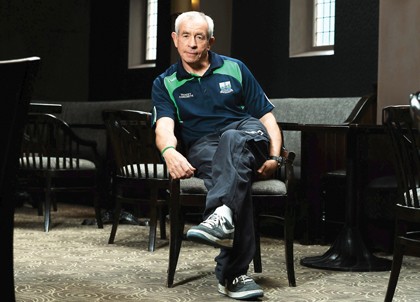
Fermanagh manager Pete McGrath knows a thing or two about motivating players
After a disappointing first round defeat last season, Oisin McConville and John McEntee have certainly inspired Crossmaglen as they powered their way recently to an 11th Ulster Club title.
Way back, Joe Kernan began the process of inspiration with three All Ireland Club titles for Cross’ before taking Armagh to their first All Ireland title. Joe continues to inspire with provincial and ‘country’ success.
Jurgen Klopp has certainly inspired Liverpool to better things in the English Premier League in a short managerial term, while Joe Schmidt inspired Ireland to a worthy Six Nations Rugby title last season.
Arsene Wenger keeping Arsenal in the higher Premiership and European Cup places for years and Peter McGrath with Fermanagh last season are further examples of ‘Inspiring your Team’.
I can’t find a magic formula in how to inspire your team to succeed but here are ten possible ways to develop inspiration in your team:
1. Have a clear goal
Make sure you have a reasonable approach to achieving it and be able to explain simply this approach to players. Players need to be able to clearly see how they’re going to get from point ‘A’ to point ‘B’ and believe that it’s possible.
2. Be enthusiastic about each player’s contributions
Remember how good it felt when your teacher in school recognised your contribution. You glowed all day and floated home. It costs nothing to tell players how they’re doing. Recognising what they’re doing well, giving ideas on how they can be better, goes a long way.
3. Accentuate players ‘positives’ and leave negatives at home
Have players self-appraise weekly their performance. You as manager/coach should also appraise them. Begin with what’s working positively as you discuss ‘yours’ and ‘their’ appraisal of their performance together.
Decide between you what’s working as a strength and devise ways how to improve these strengths. Consider between you ‘one or two’ things that aren’t working for them. Arrange for a ‘one-to-one’ clinic to fix what’s not working.
See the positive possibility and opportunity in every challenge you undertake with your players.
4. Focus on the strengths of each player
Focusing on player weaknesses instead of building strengths is a backward approach to problem solving. Adopt a 3:1 ratio – spend three times the time working on strengths and work only on those weaknesses they need to fix.
Focusing on strengths is a faster, more effective way of developing things that work, as well as making players feel happier because they’re doing what they’re good at and feel they’re contributing at their highest level.
5. Remove obstacles in your players’ way
When you do this, eg, bring in equipment they needed, attend properly to nutritional needs, employ the best coaches in each area of team preparation, etc, shows your team that you are solidly behind them. They know you care.
6. Get the slackers off the team
Nothing brings down a team like ‘slackers’ – players who aren’t pulling their weight. They lower the standards of the team making it seem like quality doesn’t matter. Removing ‘slackers’ who aren’t performing improves team morale as it shows your team you’re serious about the best results. Slackers have never been tolerated in the Crossmaglen set-up.
7. Roll up your sleeves
When you, as manger/coach, work with the team in areas where you can contribute, eg, clinics, on the training field, in the physio room, visiting injured players, etc, sends a strong message showing that you are part of the team.
8. Acknowledge players’ contributions every week
Make sure you speak to every squad player at least once a week, especially the good contributions they’ve made.
9. Be a model of accountability
If you hold players to account re punctuality, attendance, attitude, etc, you, as coach/manager, must fulfil expected standards yourself and be accountable to the team if you don’t. ‘Do as I do’ is your mantra, not ‘do as I say’. Be as committed to players as they are to you.
10. Show and communicate your team’s progress
Relay any progress to players on a weekly basis. Celebrate that progress.
The cement that holds these ‘10’ techniques together is by making all you do fun. Let the sound of laughter inspire your team to be the best they can be.
Remember too, ‘example is not the main thing in influencing others. It’s the only thing’. (Albert Einsstein).
Go on, inspire your team to success.
Receive quality journalism wherever you are, on any device. Keep up to date from the comfort of your own home with a digital subscription.
Any time | Any place | Anywhere











